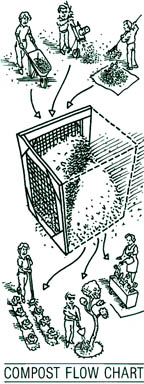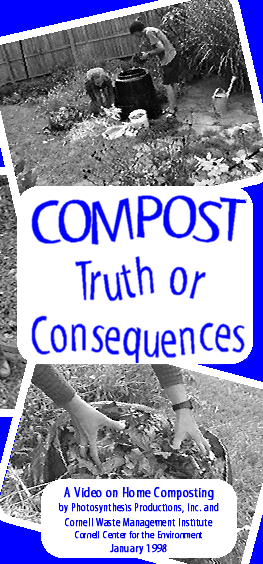 |
|||||||
| CWMI Home > Small Scale or Backyard Composting | |||||||
|
A significant fraction of the solid waste generated in the United States is organic material that can be recycled through small scale composting. There are many advantages to this strategy of waste management. Households, businesses and institutions may save money by composting items such as food scraps and yard trimmings while sending less waste to landfills and incinerators. In addition, small scale composting is often the most environmentally sound way of recycling organic materials. The finished compost is a good soil amendment for a variety of gardening and landscape uses. Health Considerations. Health concerns relating to compost are dependent both on the individual and on the material being composted. Dog and cat manures can contain harmful pathogens and should be avoided. While few human pathogenic organisms are found in vegetative wastes, normal sanitary measures (i.e., washing hands before touching food, eyes, etc.) are important. Although most people are unlikely to have any problems, there are a few concerns which place some individuals at risk. Just as individuals vary in their resistance to disease, a few individuals may be particularly sensitive to some of the organisms in compost. The high populations of many different species of molds and fungi in an active compost process can cause allergic responses in some people, though most experience no adverse reaction. One of these fungal species, Aspergillus fumigatus, can infect the respiratory system of a sensitive person who is heavily exposed. Conditions that may predispose individuals to infection or an allergic response include: a weakened immune system, allergies, asthma, some medications such as antibiotics and adrenal cortical hormones, or a punctured eardrum. People with these conditions should avoid turning compost piles or take precautions to minimize exposure. To minimize these potential risks, common OSHA approved dust masks can be worn under dry and dusty conditions, especially when the compost is being turned. If, following these precautions, individuals still develop an infection or have an allergic reaction to compost, they should consult a medical professional. Composting at Home - The Green and Brown Alternative. 12-page fact sheet shows how to separte and collect organic residuals, and how to choose a compost unit. 2011. Compost Education Program of Cornell Cooperative Extension of Tompkins County. http://ccetompkins.org/compost/ COMPOST: Truth or Consequences is a 15-minute video using a quiz show format to present common questions. It shows home composters learning how to provide the right conditions for composting without problems. User's Guide included. Composting in Schools. Part of the Cornell Composting web site maintained by CWMI. Composting to Reduce the Waste Stream. 44-page guide to small scale food and yard waste composting. Produced by NRAES-43 (PALS). Free download. Composting: Wastes to Resources is a guide for those who want to educate youth about composting. The packet includes: a 36-page instructional guide, two posters: "Best Ever Compost" and "How Does Composting Work?" and 11 designs for compost systems. Home Composting. 4-page "how-to" fact sheet containing information about food and yard wastes composting. Home Composting Slide Show. A 4-part presentation about: Organisms Involved in the Compost Process; Manageable Components of the Composting Process; Materials that can be Composted; and Systems. Also updated in a PDF format. Home Garden Use of Milorganite®. A two-page fact sheet addressing questions and answers about the use of dried sewage sludge material in the home garden. 2006. Health & Safety Guidance for Small Scale Composting. A two-page fact sheet resulting from a study conducted by CWMI to explore the presence and distribution of bacterial pathogens in small scale compost bins and piles. The full report is also available at: Hygienic Implications of Small-Scale Composting in New York State. 2004. Health & Safety Guidance for Composting in the School Setting. A two-page fact sheet providing guidance for those concerned about exposure to compost. 2005. It's Gotten Rotten video is a 20-minute video (free download or purchase) designed to introduce high school students to the science of composting. It focuses primarily on the biology of the invertebrates and microorganisms that decompose organic matter. Teacher's Guide included. Master Composter Program Guide and Resource Manual. This two-part manual provides the resources needed to create and implement a Master Composter Program. Preventing Animal Nuisances in Small Scale Composting. A two-page fact sheet describing how to "nuisance proof" your compost. A survey conducted by CWMI of NYS Cooperative Extension Offices and the NYS Association for Reduction, Reuse, and Recycling, Inc (NYSAR) members to measure the abundance and availability of home composting resources to the general public. Small to Medium Scale Composting of Food Wastes in New York City Final report by Cornell Dept of Food Science and City Green, Inc. |
For more information, contact your local Cooperative Extension Office.



